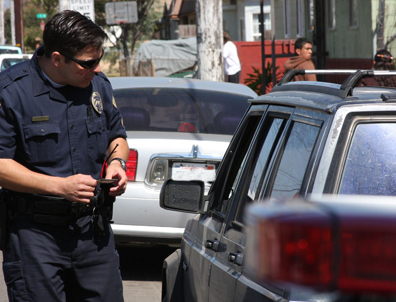
Police departments are beginning to recognize that racial, ethnic and gender biases influence the behavior of police officers, according to a panel of experts at a recent Oakland Citizens’ Police Review Board (CPRB) forum on biased-based policing.
“There are biases we bring to the job and biases we are taught in the police department,” said Chief Ron Davis of East Palo Alto, an expert in racial profiling. “All communities are dealing with it. It’s a human behavior issue. It doesn’t help to pretend we’re blind to differences. We have to create a system that filters out our biases.”
Davis said as an African-American man he has been the victim of racial profiling and as an officer he had been guilty of racial profiling. “Now as chief I’m responsible to make sure biases don’t influence policing,” he said.
Jack Glaser, an associate professor and social psychologist at U.C. Berkeley with an expertise in stereotyping and discrimination, said more than 100 years of psychological research has established that stereotyping and prejudice, which lead to discriminatory behavior, are pervasive parts of normal human cognition.
“Biases are pervasive and discrimination is pervasive. They operate outside conscious awareness and control,” he said, referring audience members to two online sources, understandingprejudice.org and projectimplicit.org, the later allows visitors to test their own prejudices. Regarding police officers, he said police data around the country establishes racial and ethnic bias. “Stereotyping and prejudice are normal but they are not desirable.”
Later in a phone interview, Glaser said the leadership of major city police departments are acknowledging the problem of bias and looking honestly at the data. He and several colleagues are working with the Oakland Police Department to analyze the police stop data for racial disparities.
At the forum, Patrick Caceres, acting manager of the CPRB, said disparities can show up in who is stopped, who is handcuffed, how long a person is detained and whether or not he or she is arrested.
“The discussion moves beyond racial profiling toward the bias we all possess, including even the most well- intentioned officers,” Caceres said.
Panelists explored the difference between what might be legal and what is legitimate police behavior. An officer might have legal grounds to stop a suspect, but was it a legitimate stop? Davis said police departments and communities have to understand that measuring police behavior by what’s legal isn’t enough. To establish a good relationship with the community, necessary for good policing, the standard has to be what’s legitimate.
Panelists repeatedly pointed out that biased-based policing is not effective. “An officer asked me how to tell a fellow officer he was engaged in racial-based policing,” said James Chanin, a civil rights attorney who specializes in police brutality cases. “I said talk to him from a law enforcement point of view. If you stop 12 people based on their race and don’t find any evidence, that’s not effective policing.”
When Davis was asked if he thinks gang injunctions lead to stereotyping, he said he thinks they actually lead to less stereotyping because they are focused on identified individuals.
“Intelligence counters stereotypes. An injunction targets individuals, not a group. You want to take the guesswork out of policing. Racial profiling is about guesswork,” he said.
Panelists said accusing officers of being racist is counterproductive.
“We have to admit there’s a problem. But if we call officers racist, that ends the conversation,” Chanin said.

